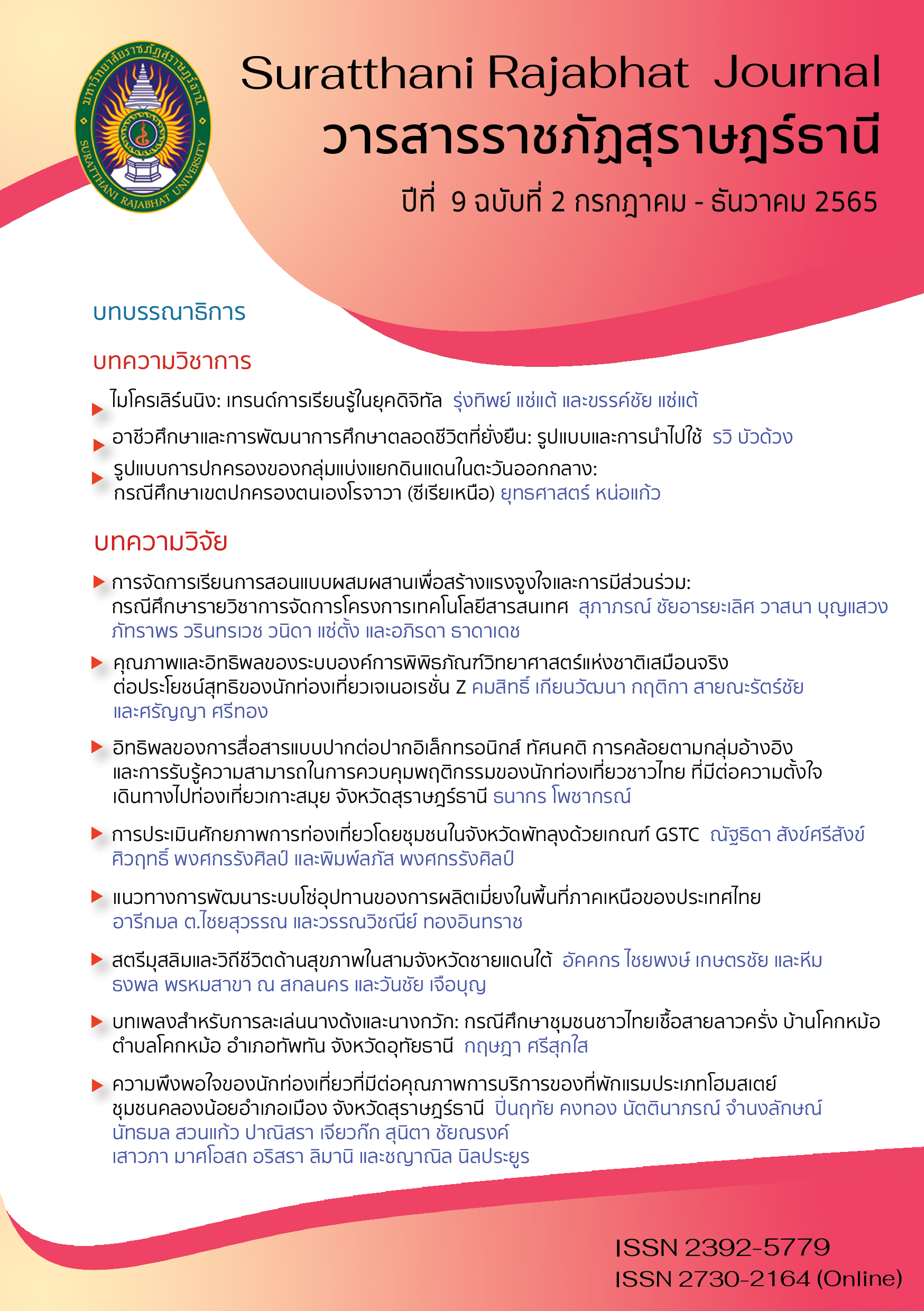Micro Learning: Learning Trends in The Digital Age
Main Article Content
Abstract
Global challenges are faced by disruptive technology and the COVID-19 epidemic situation. As a result, technology has been used as a leap forward in the education system and the lifelong learning process. In digital formats, digital platforms and media have been developed in various ways, especially digital media, that is gaining popularity and responding to the learning habits of people of this era who want to develop knowledge and skills in a particular area according to their own objectives: micro-learning, a short course-based learning that emphasizes a connected essence. Learners can repeat it several times and can learn anytime, anywhere on different types of devices. The objective of this article was to study the principles, concepts, theories related to micro-learning as well as the meanings, the concepts, the main components, the advantages and limitations, the development, and the implementation of micro-learning as a way to develop, to promote the use of micro-learning to further improve the quality of learning.
Article Details

This work is licensed under a Creative Commons Attribution-NonCommercial-NoDerivatives 4.0 International License.
References
ขวัญชนก พุทธจันทร์. (2563, 26 พฤศจิกายน). การเรียนรู้แบบ Micro – Learning. https://www.lib.ku.ac.th/2019/index.php/covid-19/1041-microlearning.
ชัยศาสตร์ คเชนทร์สุวรรณ. (2563). การพัฒนาผลสัมฤทธิ์ทางการเรียน เรื่อง พันธุกรรม ด้วยไมโครเลิร์นนิง สำหรับนักเรียนระดับชั้นมัธยมศึกษาปีที่ 3. Research and Development Journal Suan Sunandha Rajabhat University, 12(2), 137-147.
นภดล เลือดนักรบ สุภาณี เส็งศรี และพิศิษฐ์ พลธนะ. (2560). ICT: เทคโนโลยีสารสนเทศเพื่อสนับสนุนการเรียนรู้สู่การเปลี่ยนแปลง. วารสารวิทยาลัยพยาบาลบรมราชชนนี อุตรดิตถ์, 9(1), 70-80.
บริษัท ไออาร์พีซี จำกัด (มหาชน). (2561). รายงานบูรณาการประจำปี 2561. https://www.irpc.co.th/wp-content/uploads/2019/06/IRPC_Integrated_Report_2018_TH.pdf
พสุ เดชะรินทร์. (2563). การเรียนรู้ของผู้ใหญ่. กรุงเทพธุรกิจ. https://www.bangkokbiznews.com/blogs/columnist/126012
ลัดดาวัลย์ คงสมบูรณ์. (2562). การพัฒนาไมโครเลิร์นนิง สำหรับนักศึกษาระดับประกาศนียบัตรวิชาชีพชั้นสูงวิทยาลัยอาชีวศึกษาเอกชน ในเขตกรุงเทพมหานคร. วารสารวิชาการ มหาวิทยาลัยกรุงเทพธนบุรี, 8(2), 51-62.
สำนักงานคณะกรรมการพัฒนาการเศรษฐกิจและสังคมแห่งชาติ. (2561). ยุทธศาสตร์ชาติ ระยะ 20ปี (พ.ศ. 2561 - 2580).
สำนักงานเลขาธิการสภาการศึกษา. (2560). แผนการศึกษาแห่งชาติ พ.ศ. 2560 – 2579.
เสาวณี จันทะพงษ์. (2564). Upskill & Reskill สร้างแรงงานเข้มแข็ง. กรุงเทพธุรกิจ. https://www.bangkokbiznews.com/news/detail/927702
อาภรณ์ ภู่วิทยพันธุ์. (2563). “ศิลปะการเรียนรู้ด้วยตนเองแบบ Micro Learning”.
วารสารธรรมนิติ HR Society Magazine, 18(205), 29-33.
Bradbury, N. A. (2516). Attention span during lectures: 8 seconds, 10 minutes, or more?. Advances in Physiology Education, 40(4), 509-513.
Buchem, I., & Hamelmann, H. (2010). Microlearning: a strategy for ongoing professional development. eLearning Papers, 21(7), 1-15.
Buhu, A., & Buhu, L. (2019). The applications of microlearning in higher education in textiles. The 15th International Scientific Conference eLearning and Software for Education. (pp.373-376), April 11-12, 2019. National Defense University, Romania.
Doolen, D. (2020). Why Microlearning is the Key to Career Success. https://www.careercontessa.com/advice/what-is-microlearning/
Giurgiu, L. (2017). Microlearning an Evolving Elearning Trend. Scientific Bulletin, 22(1), 18–23.
Hissi, O., Jdidou, Y., & Souhaib, A. (2017). Using micro-learning process to develop MOOC content. The 5th International Virtual Conference on Advanced Scientific Results. (pp.65-68), July 26-30, 2017.
Mohammed, G. S., Wakil, K., & Nawroly, S. S. (2018). The effectiveness of microlearning to improve students’ learning ability. International Journal of Educational Research Review, 3(3), 32-38.
Namprom, T. (2020, November 30). Vonder… Microlearning EdTech Startup สายเลือดไทย. https://properea.com/vonder-microlearning-edtech-startup-30-11-2020/
Park, Y., & Kim, Y. (2018). A design and development of micro-learning content in e-learning system. International Journal on Advanced Science, Engineering and Information Technology, 8(1), 56–61.
Sudarshana, S. (2016, August 24). 8 Tips for Creating Effective Microlearning Courses. https://www.infoprolearning.com/blog/8-tips-for-creating-effective-micro-learning/.
Singh, N., & Banathia, M. (2019). Micro-Learning : A new dimension to learning. International Journal of Scientific and Technical Advancements, 5(1), 141–144.


